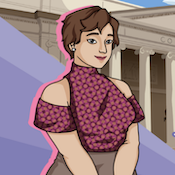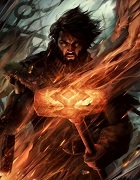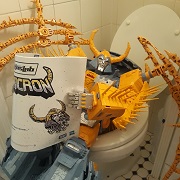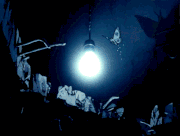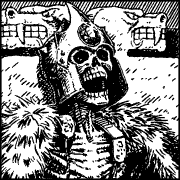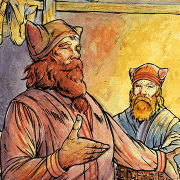|
Man, I wish I had a friend good enough to force me to watch television I hate.
|
|
|
|

|
| # ? Apr 20, 2024 03:44 |
|
I'm not a big Whedon fan either but Firefly isn't bad or even too obnoxious. It's just forgettable. I can probably remember more from the handful of Doctor Who episodes I've seen than all of Firefly.
|
|
|
|
idonotlikepeas posted:Man, I wish I had a friend good enough to force me to watch television I hate. If I listened to my friends I'd be watching MLP so I count my blessings.
|
|
|
|
"Sometimes, in the smoke, I see the most terrible things. A face, a face of stone." OH NO SHE'S WATCHING LOVE AND MONSTERS
|
|
|
|
You all need better friends
|
|
|
|
Toxxupation posted:"Sometimes, in the smoke, I see the most terrible things. A face, a face of stone." Really, when you think about it, the Weeping Angels are just the embodied form of whatsherface's impotent rage.
|
|
|
|
Toxxupation posted:"Sometimes, in the smoke, I see the most terrible things. A face, a face of stone." Weren't you, like, going to do reviews less often? Not that I'm complaining, but I'm in favour of you having a social life and I'm fearful that when I read DoctorWhat's posts what I'm actually staring into is your future.
|
|
|
|
I don't know why you guys would subject Occ to having to review Whedon shows when the most logical conclusion after Doctor Who is another time travel show.
|
|
|
|
LEGO Genetics posted:I don't know why you guys would subject Occ to having to review Whedon shows when the most logical conclusion after Doctor Who is another time travel show. Oxxipation's Mr. Peabody and Sherman Review Thread
|
|
|
|
My earlier challenge was a lie and I revel in the chaos it has caused. Occ's doing this last review to lock in his new, less intensive schedule. The next one will go up on Friday.
|
|
|
|
Just one more then I'll cut back I swear.
|
|
|
|
Jsor posted:I liked Buffy and Angel quite a bit, but I really can't get into the whole Whedon cult. I think Buffy is good in spite of the Whedonesqueness not because of it. Well, at least seasons 2 and 3 are good.
|
|
|
|
Lipset and Rock On posted:I'm fearful that when I read DoctorWhat's posts what I'm actually staring into is your future. 
|
|
|
|
It's a pity, because there was some rough equivalency there. Ten episodes of Gracepoint (or eight of Broadchurch) versus fourteen of Firefly? Seemed fair.
|
|
|
|
|
ahahahaaahhahahaa oh my god i can't breathe
|
|
|
|
LEGO Genetics posted:I don't know why you guys would subject Occ to having to review Whedon shows when the most logical conclusion after Doctor Who is another time travel show. Clearly he should try the ITV equivalent. Primeval. 
|
|
|
|
Yvonmukluk posted:Clearly he should try the ITV equivalent. ...Did he kill your mother or something?
|
|
|
|
There are no spoilers in this but I'm hiding this question regarding the currently to be reviewed episode just to be ultra-safe: I don't know how much Occ knows about future casting, would it be interesting to mention to him that this episode contains both a future Doctor and a Companion?
|
|
|
|
He knows about both Capaldi and Gillan and I mentioned already that they both show up (well, for Gillan anyway, Capaldi's a bit obvious).
|
|
|
|
no, no! please...vapors...please tell me these visions can yet be changed!
|
|
|
|
kant posted:I think Buffy is good in spite of the Whedonesqueness not because of it. Well, at least seasons 2 and 3 are good. I'll agree to disagree but I disagree hard. Buffy is Whedon as all gently caress and it's good both because of and in spite of that. As proof of how Whedon as gently caress it is I cite the fact that every single Whedon project since Buffy has been Buffy-esque as all gently caress in one way or another, most notably in its use of the "surrogate family" theme (even above the quipping). Also every Season of Buffy was good (even 1 and 6), even after Whedon had basically left and the show started eating its own tail (because it at least acknowledged it was eating its own tail and then had the grace to evolve and end, even if it wasn't as strong as what had come before). Oxxidation posted:He knows about both Capaldi and Gillan and I mentioned already that they both show up (well, for Gillan anyway, Capaldi's a bit obvious). Even Gillan is quite obvious provided you know what she looks like, as aside from being very easy on the eyes the girl has a strong screen presence.
|
|
|
|
mind the walrus posted:I'll agree to disagree but I disagree hard. Buffy is Whedon as all gently caress and it's good both because of and in spite of that. As proof of how Whedon as gently caress it is I cite the fact that every single Whedon project since Buffy has been Buffy-esque as all gently caress in one way or another, most notably in its use of the "surrogate family" theme (even above the quipping). I'm not sure if that's really good proof considering none of his other projects are any good. It's like he took only the bad parts from Buffy and amplified them. :P
|
|
|
|
Toxxupation posted:no, no! Never before has your avatar been more fitting.
|
|
|
|
This is loving gold, thank you for making it.
|
|
|
|
Arsenic Lupin posted:I used to be in the Whedon cult and then I watched DOLLHOUSE. It's the Narcan for Whedonine. Yvonmukluk posted:Primeval. mind the walrus posted:I'll agree to disagree but I disagree hard. Buffy is Whedon as all gently caress and it's good both because of and in spite of that. As proof of how Whedon as gently caress it is I cite the fact that every single Whedon project since Buffy has been Buffy-esque as all gently caress in one way or another, most notably in its use of the "surrogate family" theme (even above the quipping). Also every Season of Buffy was good (even 1 and 6), even after Whedon had basically left and the show started eating its own tail (because it at least acknowledged it was eating its own tail and then had the grace to evolve and end, even if it wasn't as strong as what had come before). Also, why is everyone so down on Firefly? It's not as great as the huge Whedon fans make it out to be, but nothing is. It's a pretty fun show though.
|
|
|
|
Season 6 had the misfortune of taking a ton of ideas that were decent enough in isolation, and then ruining the whole season by using them all at once to create a swirling morass of depression and general malaise.
|
|
|
|
Doctor Who "The Fires of Pompeii" Series 4, Episode 2 "The Fires of Pompeii" is a fantastic episode by its own right, arguably the best to air in the entire series run thus far, but it's all the more impressive when viewed in the light of the episodes that it follows. As Oxx has noted, every season has had either a change in Doctor or in Companion, and RTD has structured each season of the revival Who to spend its first episode having The Doctor and his new Companion (or in Series 2's case, the Companion and her new Doctor) meeting each other on present-day Earth, with the next two episodes being a trip to the far, far future and the distant past. So, we can therefore compare and contrast all four, so far, "past trip" episodes of each season against each other; Series 1 had "The Unquiet Dead"; Series 2, "Tooth and Claw"; Series 3, "The Shakespeare Code"; and now in Series 4, we have "The Fires of Pompeii". Those previous three episodes were all, at best, "competent but not stellar", and "The Shakespeare Code", while not great in and of itself, is all the worse in the watching because it's such a brazen recycling of themes and ideas. By even the third episode of its type, the plots of the "period piece" introductory episodes had become rather stale. "The Fires of Pompeii", in contrast, services the concept of a "period" episode, especially serving as an introductory episode, and rights the various wrongs that have persisted in the previous seasons up until now. Let's run them down, in order: 1. The episode uses technobabble pseudoscience bullshit to reveal the "hidden twist" behind its seemingly-magical antagonist. Every episode before "Fires of Pompeii" was guilty of this sin, and by "The Shakespeare Code" the pattern had become intolerable- because these types of stories are set during a time period on Earth when ordinary people believed in magic, what would always, always end up happening is is that the episode would set up an antagonist as some sort of mundane supernatural boogeyman (in order: ghosts, werewolves, and witches) and then would reveal at around the middle of the third act that they were actually the alien race of <whatever>! And it would try and force the audience to buy, in greater and greater diminishing returns, that such a reveal was surprising, until finally in "The Shakespeare Code" (for me at least), the episode is spent impatiently waiting and looking at the clock for whenever the writer finally deigns to stop wasting my loving time and get on with what's actually going on. So it's refreshing that within the first ten minutes of "Fires" we get that reveal over and done with. Donna and The Doctor land in Pompeii, one day before the infamous eruption of Mt. Vasuvius that killed everyone who lived there, but instead they're mostly focused on the fact that apparently all of the oracles and psychics in Pompeii have suddenly been able to accurately read people's minds and see the future. At, again, about ten minutes into the episode The Doctor encounters Lucius Petrus Dextus (Phil Davis turning in a scenery-chewing performance), an augur who has been "ordered by the Gods" to carve what looks to be a stone microchip. This is an important scene to establish why "Fires of Pompeii" doesn't come off as tedious stalling- it establishes early on that there's a clear scientific ("scientific") explanation for what's happening, and so doesn't belittle or patronize the audience by ineptly attempting to pull the wool over their eyes for half an hour or more. In "The Shakespeare Code" (not so much for the other two), in particular, the pseudoscience explanation felt completely half-assed, wherein Doctor Who wanted a supernatural episode while still pretending to be in any way sci-fi, so split the difference and in the process came off as a narrative cheat. Not so much here; the antagonist heightens humans' latent psychic powers, but the episode still fundamentally expects you to just sorta "buy" the fact that humans can be psychic for no rationally explained reason (which only really works because the existence of Timothy during the Human Nature two-parter suggested that psychic humans already existed before this episode). Contradictorally, by not explaining why things are going on the way they are, "Fires" comes off as less intelligence-insulting, because it trusts that the audience can just fundamentally buy that humans can be psychic, as opposed to "The Shakespeare Code"'s insistence that these things that totally look and act like witches in every way are not witches at all guys, no sir, nuh-uh. 2. The episode places the Companion into a firmly secondary position to The Doctor. This is a recurring problem in these types of episodes; and strangely enough, the three episodes that preceded "Fires" all failed the Companion in different ways. Most of the time in these types of episodes, The Doctor meets a famous historical figure and then spends the rest of the episode hanging out with that person. Series 1's episode, "The Unquiet Dead", had The Doctor meeting Charles Dickens; although the scenes between Nine and Dickens were fantastic (the best of the episode, no doubt), Rose was clearly a third wheel to this boys' club, so she was forced to hang out with Gwyneth for the majority of it. Gwyneth, guys. Remember her? She was that Welsh moron played by a terrible actress. This was kind of insane when you think about it, because Rose and Nine had just met. So instead of getting to know him better, Billie Piper was stuck in a boring sideplot that did nothing to service her character. Hey, wait... Series 2, "Tooth and Claw", had Rose and the newly regenerated Ten in late 19th century Scotland fighting off a And then finally, in Series 3, "The Shakespeare Code", although The Doctor meets William Shakespeare, Martha is around for all of those interactions (and even slots right in to the dynamic, due to Bill's brazen attempts to seduce her), but is kneecapped rather utterly by her downright perplexing crush on The Doctor, so what it ends up doing is cheapening who Martha is and demoting her to "doting groupie" status over a genuine human being. In all three of these cases, what ends up happening is that the Companion is turned into, at least temporarily, a glorified appendange of The Doctor. In all three previous stories, none of the Companions feel like they're being serviced by the story, like the writer wanted them there as anything other than as motivation for The Doctor in some way. In contrast, Donna in "Fires of Pompeii" is right there with The Doctor, from word one. She never leaves his side- well, except to get captured; and even then she doesn't seem like a damsel in distress in any loving way, as she bellows "Listen, sister, you might have eyes on the back of your hands, but you'll have EYES IN THE BACK OF YOUR HEAD BY THE TIME I'M FINISHED WITH YOU! LET ME GO!" The point of the thing is that Donna, fundamentally, doesn't give The Doctor or anyone else even a bit of leeway, and she forces herself into the limelight alongside The Doctor. It's weird to think about, but Rose and even Martha, most of the time, were meekly willing to allow The Doctor to do whatever he wanted in the previous three episodes, in some capacity, even if that meant literally abandoning them for long stretches of time as he hosed off with the "cool" historical figure. It was all the more befuddling when in all three cases (Nine and Rose, Rose and Ten, Ten and Martha), this is supposed to be these two main characters trying to understand how each other worked, how their personalities meshed and clashed; the audience, too, is learning about who at least one of these people "are", and in all three cases it firmly established the Companion as subordinate to The Doctor. Which, I guess, is fine (it is called Doctor Who, after all), but each establishment of the power dynamic weighted firmly in The Doctor's favor is vaguely sexist in that it sells out the Companion, in some way, to the audience. And yet you look at Donna, and Catherine Tate playing Donna, and at no loving point does the audience ever buy that she's not fully The Doctor's equal; she hamstrings and pesters and questions and needles him at every turn, demanding to be taken seriously. Which leads me into my third and final point: 3. The human stakes of an episode are largely secondary and meant to provide textural importance; everyone ends up dying but that's all right because The Doctor saved a named person/his Companion. This isn't specific to the "period piece" episodes of Who (actually, it doesn't apply to period piece episodes at all; barely anyone dies in any of them, and the ones that do get their due before kicking it), but as Oxx has mentioned before RTD has had an extremely bad habit of creating stakes that involve the imminent deaths of thousands/millions/billions, and then...ignores it. So what happens is those thousands or millions or billions of sentient beings die, but as the episode strenuously attempts to assure us, it's fine because one named person made it out due to The Doctor. It betrays a stunning amount of tone-deafness on RTD's part that these scenes and sequences kept on happening throughout his run, and not only does The Doctor, consistently, end up not lifting a finger to help these people, but the episode just completely ignores this byproduct. In one of the worst examples, "The Parting of the Ways", everyone on Satellite Five bar Jack is dead and most of Earth is nuked to hell, but Rose ends up in Nine's arms so everything's fine. gently caress, the script doesn't even bother to have The Doctor have a moment of self-reflection, over all those lives he, inadvertently or not, let die. Donna intrudes on this rather tiresome trend and kicks it right in the balls. As the climax of the episode looms, as The Doctor and Donna have figured out the Big Bads (Pyrovile, magma-spewing rock men who crashed into Earth from the destruction of their home planet, opening a rift in time that allowed them to see the future- they've been spreading themselves to all the psychics via the steam vents they use to "see the future"...look, it works in execution, okay) and are hunting them down, Donna, once again as she has done throughout the episode, brings up the eruption of Vesuvius that will destroy all of Pompeii. Donna: "How many people died?" The Doctor: "Stop it!" Donna: "Doctor, how many people died?" The Doctor: "Twenty thousand." Donna: "Is that what you can see, Doctor? All twenty thousand? And you think that's all right, do you?" Normally, the Companion would just smile and, maybe, sadly nod when The Doctor would bring up the destruction of twenty thousand lives. Rose would have probably thrown a "It's Okay, Doctor, You Tried (Although You Actually Didn't)" parade in his honor, even. But Donna...Donna doesn't play that poo poo. Her focus, throughout the entire episode, is the encroaching horror of the destruction of Pompeii, and because of it she tirelessly confronts The Doctor in his complicity in the event. Even when The Doctor impatiently explains why he can't influence what's about to happen, The Doctor: "Some things are fixed, some things are in flux. Pompeii is fixed." Donna: "How do you know which is which?" The Doctor: "Because that's how I see the universe. Every waking second I can see what is, what was, what could be, what must not. It's the burden of a Time Lord, Donna. And I'm the only one left." she doesn't accept it- she constantly pushes and questions The Doctor about the morality of his actions. And the incredible thing is, neither of them are wrong- Donna's right in that it's horrible to disregard a mass casualty like that, but the rules The Doctor plays by makes it an imperative to do what he's doing. There's a sense of comparative moral nuance to the whole "Should we save Pompeii" thing that permeates the episode in a way that feels comparatively sophisticated. And what's so incredible about having Donna say what the audience always thought, to give voice to their grievances, is that it builds up The Doctor's character as well. His Companions blindly accepting every decision he made, regardless of if it resulted in the death of millions or not, put a sociopathic edge to his resolutions- is the fact that Doctor Who is ignoring the unintended consequences of The Doctor's actions indicative that The Doctor simply doesn't care if Rose/Martha/whatever makes it out okay? Having Donna constantly bring up the thousands of unnamed Romans who will die, throughout the episode, and his increasing harried and annoyed responses about how he has a dimensional imperative to ignore it shows that The Doctor does indeed, think about the larger scope of what he's doing, and in doing so makes him more sympathetic and relatable. It even makes his dawning horror that he, in order to wipe out the Pyrovile, is the one who triggers Vesuvius- well, it's an wondrous scene, emotionally devastating as The Doctor realizes, "If Pompeii is destroyed, then it's not just history. It's me. I make it happen." It's The Doctor committing genocide, in Donna's presence, yet again, but it's portrayed as heart-wrenchingly necessary as opposed to something The Doctor just does to save the day, eh, gently caress all those people in Pompeii who just loving died. And that wonderful emotional climax of the episode is only possible because Donna's in it, constantly pushing The Doctor to be the best version of himself he can be, constantly testing him and calling bullshit on his claims instead of enabling him. "The Fires of Pompeii" is an absolutely wondrous episode of television, an episode of Doctor Who that is emblematic of everything the show wants to be- using its narrative conceit to tell a full, realized, emotional narrative with a brilliant, conflicted main character and a Companion character who is just as necessary to the story told, with literally nothing about it that's bad, no missteps. It's an episode that realizes what's truly important about Doctor Who- the Doctor and his Companion -and focuses on that specific dynamic while still keeping track of its wider narrative and emotional scope. It's a genuine triumph of an episode of Who and I cannot say enough good about it. It's funny and heartbreaking and emotional and depressing all at once, without once feeling unearned or tonally confusing. It is an incredible, incredible episode of television, and could be my new favorite Doctor Who episode of all time. Grade: A Random Thoughts:
NieR Occomata fucked around with this message at 04:25 on Oct 7, 2014 |
|
|
|
I knew you'd love this episode. Donna Noble isn't a companion, she is a force of nature.
|
|
|
|
These reviews really make me see the episodes in a new light. I originally watched the launch of the revival all the way through to the end of The End of Time in as few sitting as possible, and I'm starting to realize I missed out on a lot as a result. I may have to give this episode another look, because I originally considered it a mere filler episode.
|
|
|
|
Fires of Pompeii is one of my favourite episodes in the revival. It's not a big flashy thing like The Empty Child / The Doctor Dances, or something clever and experimental like Blink, it's just a straight forward monster-of-the-week affair that works. Getting access to the Rome sets helped a lot too, since it helps the story look far more lavish than the average episode (similar things happened in the original series as well, since they sometimes had access to BBC's innumerable period drama costumes).
|
|
|
|
This is a fun little episode, but I prefer Partners in Crime over it. Best laughs I had this episode: Tardis as a modern piece of art the dad bought. Soothsayer-off with Lucius and Evelina.
|
|
|
|
Doctor Spaceman posted:Getting access to the Rome sets helped a lot too Ohh, that explains it. I did wonder about how they pulled it off.
|
|
|
|
Toxxupation posted:Donna is so loving great. It's kind of neat when the subtext of every episode doesn't have to be "The Companion is IN WUVVVVV with the Doctor."
|
|
|
|
Yeah Donna is amazing and her interactions/chemistry with the Doctor in this episode is incredible. I think perhaps the best part of it though, which is such a quiet and subtle moment, is early in the episode when the Doctor hisses at Donna to shut up while he's doing something. She takes him aside and quietly tells him,"I don't know what kind of person you've been traveling around with before me.... but you don't ever tell me to shut up." It's such a refreshing change of pace from Rose and Martha's lovesick awe of the Doctor, and it comes across so naturally. I could never get enough of these two together.
|
|
|
|
Toxxupation posted:[*] Donna: "You fought her off...with a water pistol! I bloody LOVE you!" I love that Donna can have this line and not have it be cloying or frustrating or a sign of her mooning over the Doctor... it's just pure Donna exuberance.
|
|
|
|
Doctor Who "The Fires of Pompeii" Series 4, Episode 2 Doctor Who is, on the balance, quite lighthearted (a show for children, let us never forget, even as the number of words I've written about this loving thing creep towards novella status). It veers towards camp whenever possible, its character interactions are sitcom-quality on a good day, it's got more lumbering CGI monstrosities than a PSX game and its title character often acts so hyper that I'm pretty sure passing mosquitoes spontaneously combust when they try to take a sip of him. There are occasions when it slips into somber, scary, or thoughtful, but usually there's at least some warning sign that such a whiplash is coming - "Father's Day," for instance, begins with a quiet voiceover from Rose about her deceased father, so it can be safely assumed we are not in for happy times even when the Langoloyles show up to confuse the episode's tone. The most insidious of these tonal changes, however, creep in gradually, wearing their silly premise as a mask until the climax hits; it's like watching a goofy little waist-height automobile pull up beside you and then the doors fling open and you're stampeded by a horde of emotion clowns. That was a rubbish analogy. Forget the clowns. Send away the clowns. "The Fires of Pompeii" is definitely in that vein, though. It starts with Donna swanning about the titular city as thought it were a great big theme park, all hugs and semi-condescending remarks towards the Doctors - and then the volcano rumbles, and the first cracks start to show in the facade. But even then, the episode hurriedly papers over that event with Lucius Caecilius' family, which had may as well be characters in the kind of WB sitcom that doesn't make it half a season, even if Peter Capaldi and his eyebrows put across a wonderful performance from beginning to end. Episode writer James Moran (who contributed only this one script to the series, though he apparently also did some work on Torchwood) spends the next thirty minutes or so balancing these two aspects: on one hand, you've got a standard Who episode, full of goofy side-characters and hammy performances and ridiculous lava-centurion aliens. On the other hand, the volcano rumbles, reminding everyone that there's no way this story can end well. The Doctor would very much like the story to stick to the goofier aspect, fighting off aliens and solving mysteries and jettisoning off in the TARDIS before the larger consequences can roll over him. He would like to save the day with a water pistol and never, ever answer why he carries a water pistol at all times. He would like to be daring and clever and not have people ask him uncomfortable questions. But Donna has other ideas. As before, Donna's solely responsible for elevating the script from merely good to fantastic, and for much the same reasons as "The Runaway Bride" - she spends most of the episode pursuing an entirely different agenda from the Doctor, determined to kick history in the pants and save Pompeii no matter how much grandiloquent philosophizing about fixed points and fuzzy endings her timey-wimey chaperone tries to spray into her face. As Occ noted, Donna is the first Companion so far who's gone against the Doctor to such an extent that he's actually forced to explain himself for a change, instead of just making vague, tearful speeches about the loneliness of the Time Lord or the beauty of Gallifrey, and even when those explanations are given, Donna still refuses to bend against the history that the Doctor holds so sacred. There's a clash of values present between the Doctor and Donna in "The Fires of Pompeii" that may be the most successful attempt to date at making the Doctor seem genuinely alien. He's rambled on about "fixed points" and "established events" before, but this is the first time he's forced to give us some hard facts along with those vague phrases - as he explains it, Time Lords have a need to preserve the integrity of the timeline baked right into their DNA, able to see the ebb and flow of events and where changes can or can't be made. Forget about shattering the world's timeline; the idea of altering fixed points physically repulses Time Lords, just like the Doctor instinctively raised his hackles at the immortalized Captain Jack. Donna patiently listens to all of this, and then, in a perfectly reasonable, human decision, tells both him and history to go pound sand - twenty thousand people are about to turn to ash while they're in a position to stop that from happening, and allowing it to happen anyway just isn't cricket. But, of course, history has other ideas. The world turns out to be doomed again, and instead of sticking to her principles anyway (which in this context would make her look like a bit of an idiot), Donna relents, and goes even further, detonating the volcano with the Doctor so he won't have to shoulder the responsibility alone. The facade cracks. The humor is gone. The ugly half of "The Fires of Pompeii" comes out in force, and stomps all over our hearts. More effort was put into this episode's production than nearly every other one we've seen thus far - it was actually shot on-location in Rome, and the architecture, camera work, and bustling extras go a long way towards making it feel like a living city, which of course makes it all the more wrenching when it becomes a dead one. The CGI for the spewing volcano is unusually competent, and the sight of the huddled, weeping citizens, already coated under a fine layer of ash, is haunting even without Donna staggering through the crowd, still desperate to do some good even as history bears down on Pompeii as inexorably as the lava. Moran puts a frankly uncomfortable amount of work into making the post-eruption scenes as depressing as possible. Donna screams directions to the crowd, her advice drowned out by the terror of the people she's trying to save. She nearly rescues a lost child from the mass, only for her mother to pull her away and towards certain death. Caecilius huddles under the eaves of his house as the ash pours down, and gives his daughter a brief, helpless kiss on the forehead. Catherine Tate's own performance is loving transcendent, and forced pretty much every remaining nay-sayer about her character to shut up and sit down for the rest of the season; Donna's dream has finally come true, and her first "adventure" has her watch a whole city die screaming, but even through her devastation she still hammers on the Doctor's own confused conscience until he finally, briefly, relents. It's thanks to Donna that we salvage the barest scrap of a happy ending from "The Fires of Pompeii," but the scene where the Doctor et al watch the ash pour over Pompeii (and the CGI artists actually took the time to model fleeing citizens as death pours over them, how nice) makes it clear that this is far from a victory. The scene grows quiet, and we, the audience, are made to reflect upon this tragedy, and the tragedies that follow it, and the tragedies yet to come - the fixed points, the unchangeable moments that not even the Doctor, even if he were real, could ever fix. Humanity might persevere, but history will engulf us again and again, and we are forced to build our future on the ashes of those who couldn't run away in time. A sober moment, and that could've been enough. But the episode has one more nasty trick up its sleeve. "The god Vulcan must be enraged," Capaldi snarls, his eyebrows appearing to momentarily eat each other. "It's so volcanic...it's like some kind of...volcano." Oh Christ, we think, rolling our eyes. There's the Doctor Who we know and love. Completely tone-deaf, with editors who never know when enough is enough. We're back to comedy, the worst is probably behind us- Capaldi's voice breaks. "All these people..." ...I didn't cry. My eyes might've watered a bit. And they do that all the time, I keep the air so dry a mummy would complain. Anyone's eyes would water in that environment. Shut up! Moving on! The Doctor and Donna are both enshrined as gods by the end of "The Fires of Pompeii," but it's Donna who deserves top billing as heroine this time, even if the Doctor contributed his spaceship. The Doctor, and especially Ten, often lets his fatalism get the better of him, sinking so deep into maudlin self-pity that he loses sight of the people he's supposed to save; Donna spent the whole episode trying to smack that out of him, and the rescue of Caecilius was victory enough for her. After detonating the volcano, the Doctor veered dangerously close to the same worship of endings and termination that the Master showed off in the previous season. Donna ensured that some spark would survive the devastation that followed, and that the kindness they showed one family would be perpetuated by history - ensured, in other words, that the end is never the end. Oxxidation fucked around with this message at 05:11 on Oct 7, 2014 |
|
|
|
Man, how much poo poo do you think they gave the son for the rest of their lives? Remember that time you killed one of the Gods' messengers and then our entire town was wiped out? Way to go.
|
|
|
|
"The Fires of Pompeii" made me into a Doctor Who fan. In like a MILLION WAYS!
So you can blame (or credit) "The Fires of Pompeii" for the person I am today. I turn 20 years old on Thursday; I'll have been watching this show for a quarter of my life and change. What a weird thing.
|
|
|
|
...I am going to do so badly at the prediction game because I forgot just how loving good this season is. Donna has already proven herself as the best companion two episodes into the season.
|
|
|
|

|
| # ? Apr 20, 2024 03:44 |
|
I just rewatched this episode for the first time since I first saw it, and I can't for the life of me figure out why I thought so poorly of it at the time. It's got everything I like in a DW episode. Great guest cast, Donna, fun plot, some moral complexity, Donna...
|
|
|








